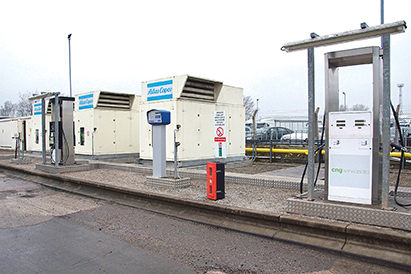
WHY CNG?
![]() BUSRide met with George Kalet, CNG applications and key account manager for Atlas Copco, Gas and Process Group, to discuss compressed natural gas (CNG) for transit buses. We compare CNG to diesel fuel and discuss the environmental benefits of natural gas. Furthermore, Kalet provides methods for overcoming the barriers to CNG conversion.
BUSRide met with George Kalet, CNG applications and key account manager for Atlas Copco, Gas and Process Group, to discuss compressed natural gas (CNG) for transit buses. We compare CNG to diesel fuel and discuss the environmental benefits of natural gas. Furthermore, Kalet provides methods for overcoming the barriers to CNG conversion.
Why is CNG a better alternative to diesel fuel?
George Kalet: The overriding factor right now is still the cost of CNG compared to diesel fuel. I would characterize that as price stability when compared to the roller coaster ride that we’ve been on with diesel fuel prices.
Over the next two decades, all estimates and forecasts indicate that the price for natural gas is going to be very stable and, if anything, decrease – simply because of the new supplies that have been discovered in North America. Horizontal drilling allows us to recover natural gas from shale fields and other locations that were previously inaccessible. It has essentially turned the U.S. into the Saudi Arabia of natural gas.
What are the environmental benefits of CNG?
Kalet: The biggest advantage is that natural gas is a pure gas and does not leave any carbon particulate matter behind when it is burned. The other big thing about CNG is the NOx . Natural gas is a lower NOx fuel so it reduces NOx emissions quite a bit.
What are some of the barriers to converting to CNG? How can agencies and operators overcome those barriers?
Kalet: The barriers are, of course, the additional costs of the fuel storage system onboard the vehicle. There are additional costs for both the natural gas engine and the fuel storage containers. Historically, there has always been a fairly significant premium in the neighborhood of $20,000 to $25,000 for a heavy-duty vehicle.
Two things have happened to change that. First, the Environmental Protection Agency (EPA) has continually lowered the emissions standards for diesel engines. That’s resulted in the engine manufacturers having to add components like after treatment and catalytic converters onto their engines, thus increasing the costs. CNG engines did not require these additional systems in order to comply. The cost for diesel engines is going up while the cost for natural gas engines is going down.
Secondly, significant developments were made on the fuel storage side when manufacturers released heavy-duty, lightweight CNG storage cylinders that are much more competitive. They’re still significantly more expensive than the standard space-conforming steel diesel tank, but the overall weight of the fuel system has decreased dramatically in the last five years.
The range of CNG vehicles 10 years ago was approximately 50 percent of the range of similar diesel vehicles. That turned out to be a huge barrier to entry that has been overcome by technology developments in the fuel storage systems.
So much of the initial capital expenditure for transit fleets and infrastructure is funded by the Federal Transit Administration (FTA), and that funding is enhanced if it’s for an alternative fuel vehicle. That helps agencies recover their costs and provide a better service to the community.
Because gasoline and diesel prices are being artificially held down this year, CNG is currently cost neutral. However, CNG is a very clean burning fuel that doesn’t leave any particulate deposits in the engine. Operators get much longer life out of the engine oil. Agencies can extend engine oil change intervals for longer periods of time and that can be a very significant cost saving.
Visit www.atlascopco.us for more information.
